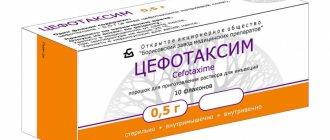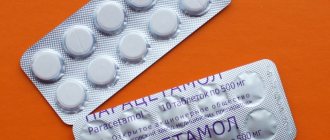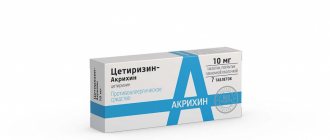Pharmacodynamics and pharmacokinetics
Pharmacodynamics
Micardis Plus is a combination of telmisartan angiotensin type II receptor blocker hydrochlorothiazide ( diuretic ). The combined use of these components causes a stronger antihypertensive effect than using them separately. Taking the drug once a day leads to a pronounced gradual decrease in blood pressure.
Telmisartan is a selective angiotensin type 2 receptor blocker. Has high affinity for angiotensin II receptors of the AT1 subtype . It displaces angiotensin II from the receptor. The binding is long-term. Telmisartan does not block other receptors (including AT2 type receptors) of angiotensin . Telmisartan also reduces aldosterone .
In persons with arterial hypertension 80 mg of telmisartan per day completely suppresses the effects of angiotensin II . The onset of action occurs three hours after ingestion of the drug. The effect lasts for 24 hours. A permanent antihypertensive effect is observed a month after regular use of telmisartan .
Hydrochlorothiazide is diuretic . Affects the reabsorption of electrolytes in the renal tubules, directly increasing the excretion of sodium and chlorides. This causes a decrease in circulating blood volume, an increase in renin aldosterone synthesis .
After administration of hydrochlorothiazide, diuresis increases after two hours, and the maximum effect is achieved after four hours and persists for 6-12 hours.
Pharmacokinetics
Telmisartan. Quickly absorbed from the digestive tract. The maximum concentration of telmisartan occurs within an hour. Bioavailability is 50%.
Reaction with blood proteins is more than 99.5%. Metabolized by interaction with glucuronic acid . Telmisartan derivatives are pharmacologically inactive.
The half-life is approximately 20 hours. Excreted with feces in its original form and with the kidneys - up to 2%.
The pharmacokinetics of telmisartan in elderly patients does not differ from those in younger patients. No dose selection is required.
Hydrochlorothiazide. After oral administration of hydrochlorothiazide, maximum concentrations are achieved within 1-2 hours. Bioavailability reaches 60%.
Reaction with plasma proteins – 64%. It is not metabolized and is excreted unchanged through the kidneys.
Use of the drug Micardis
Adults. The recommended daily dose for adults is 40 mg. In some patients, a dose of 20 mg/day may be effective. If the effectiveness is insufficient, the dose of the drug can be increased to a maximum of 80 mg once a day or used in combination with thiazide diuretics (hydrochlorothiazide), which provides a more pronounced hypotensive effect compared to monotherapy. When increasing the dose, it should be taken into account that the maximum antihypertensive effect develops after 4–8 weeks from the start of treatment. Patients with severe hypertension (arterial hypertension) can be treated with telmisartan monotherapy at a dose of 160 mg/day or in combination with hydrochlorothiazide at a dose of 12.5–25 mg/day; this combination is effective. The drug is taken regardless of food. The duration of therapy is determined individually, it depends on the nature of the disease and the effectiveness of the therapy. Patients with impaired renal function. Patients with renal failure on dialysis do not require dose adjustment. Telmisartan is not removed from the blood by hemofiltration. Patients with impaired liver function. In patients with mild or moderate liver dysfunction, the daily dose should not exceed 40 mg. No dose adjustment is required in the elderly. There are no data regarding the safety and effectiveness of Micardis when used in children and adolescents under 18 years of age.
Contraindications
The drug has the following contraindications:
- obstruction of the biliary tract;
- severe liver or kidney dysfunction;
- refractory hypercalcemia, hypokalemia ;
- fructose intolerance ;
- lactase deficiency galactose or lactose intolerance ;
- age less than 18 years;
- lactation;
- pregnancy;
- allergy to the components of the drug.
Carefully:
- stenosis of both renal arteries, severe kidney damage;
- liver dysfunction or progressive liver damage;
- hyperkalemia;
- hypovolemia after treatment with diuretics , as well as after limiting salt intake, vomiting or diarrhea ;
- chronic heart failure , functional class III-IV;
- mitral and aortic valve ;
- condition after kidney transplant;
- obstructive cardiomyopathy;
- primary aldosteronism ;
- diabetes;
- gout.
Side effects
- From the respiratory system: shortness of breath, respiratory distress syndrome .
- From the circulatory system: tachycardia , arrhythmias , bradycardia , severe decrease in blood pressure.
- From the nervous system: fainting, paresthesia , dizziness, insomnia , anxiety, depression , excitability, headache.
- From the digestive system: flatulence, diarrhea, dry mouth, abdominal pain, constipation, gastritis, hypercholesterolemia, hyperglycemia, pancreatitis, jaundice, dyspepsia.
- Skin: sweating.
- From the musculoskeletal system: muscle spasms, arthralgia , myalgia , arthrosis , chest pain.
- From the hematopoietic system: leukopenia, eosinophilia, anemia, neutropenia, thrombocytopenia, thrombocytopenia.
- From the genitourinary system: renal failure, nephritis, glucosuria.
- From the eyes: visual impairment, glaucoma, xanthopsia, acute myopia .
- Infections: sepsis , respiratory tract infections ( pharyngitis, bronchitis, sinusitis ), inflammation of the salivary glands.
- Metabolic disorders: increased creatinine, liver enzymes, creatine phosphokinase, uric acid in the blood, hypertriglyceridemia, hyperkalemia, hypokalemia, hypoglycemia, hyponatremia, decreased hemoglobin .
- Allergic reactions : skin itching, angioedema , rash, erythema , anaphylactic reactions , eczema, systemic vasculitis, necrotizing vasculitis .
Side effects of Micardis
The overall incidence of adverse events with telmisartan (41.4%) is generally comparable to placebo (43.9%) in placebo-controlled studies. The incidence of side effects does not depend on the dose and gender, age or race of patients. The adverse reactions listed below were identified in clinical trials involving 5,788 patients taking telmisartan. Infections and infestations : urinary tract infections (including cystitis), upper respiratory tract infections. Mental disorders: anxiety. On the part of the organ of vision: impaired accommodation (blurred vision). Vestibular disorders: dizziness. Gastrointestinal: abdominal pain, diarrhea, dry mouth, dyspepsia, flatulence, impaired stomach function. From the skin or subcutaneous tissue: eczema, increased sweating. Musculoskeletal and connective tissue disorders: arthralgia, back pain, calf cramps or leg pain, myalgia, tendinitis-like symptoms. General disorders: chest pain, flu-like symptoms. In addition, cases of erythema, pruritus, syncope/loss of consciousness, insomnia, depression, vomiting, hypotension (including orthostatic hypotension), bradycardia, tachycardia, hepatic dysfunction, renal dysfunction, including acute renal failure have been reported from post-marketing surveillance (see PRECAUTIONS). USE), hyperkalemia, dyspnea, anemia, eosinophilia, thrombocytopenia, weakness and lack of effectiveness. The incidence of these effects is not known. As with other angiotensin II antagonists, isolated cases of angioedema, urticaria and other similar reactions have been reported. Laboratory tests: rarely noted a decrease in hemoglobin levels or an increase in uric acid levels; also reported cases of increases in creatinine or liver enzymes, but the incidence was similar or lower compared with placebo. In addition, according to the results of post-marketing surveillance, cases of increased serum CPK levels were reported.
Interaction
When using telmisartan with:
- other antihypertensive drugs – it is possible to increase the strength of the antihypertensive effect ;
- lithium preparations – a temporary increase in lithium in the blood is possible;
- non-steroidal anti-inflammatory drugs acute renal failure may occur in patients with a reduced volume of circulating blood;
- digoxin – it is possible to increase the concentration of digoxin in the blood by 20%.
When using hydrochlorothiazide with:
- barbiturates, ethanol or opioid orthostatic hypotension may develop ;
- Metformin – possible development of lactic acidosis ;
- hypoglycemic agents and insulin - dose adjustment of hypoglycemic drugs ;
- cholestyramine and colestipol - possible inhibition of hydrochlorothiazide ;
- non-depolarizing muscle relaxants – their effect may be enhanced;
- cardiac glycosides – possible development of hypokalemia or hypomagnesemia ;
- anti-gout medications – it is possible to increase the level of uric acid in the blood.
- calcium preparations – it is possible to increase the concentration of calcium in the blood due to inhibition of its excretion by the kidneys.
- amantadine – there may be an increased risk of developing undesirable effects of amantadine ;
- m-anticholinergic blockers ( atropine , biperiden ) – possible weakening of intestinal motility, increasing the bioavailability of thiazide diuretics ;
- non-steroidal anti-inflammatory drugs - may weaken the diuretic and antihypertensive effects .
Interactions of the drug Micardis
Telmisartan may potentiate the hypotensive effect of other antihypertensive agents. Compounds that were studied in pharmacokinetic studies: digoxin, warfarin, hydrochlorothiazide, glibenclamide, ibuprofen, paracetamol, simvastatin and amlodipine. Only for digoxin, a 20% (in some cases 39%) increase in its concentration in the blood plasma relative to the average level is noted, so the need to monitor the level of digoxin in the blood plasma should be taken into account. When used simultaneously with lithium salts, it is possible to increase the concentration of lithium in the blood plasma and develop toxic reactions, therefore it is necessary to regularly monitor the level of lithium in the blood plasma. NSAID therapy (including acetylsalicylic acid in doses exceeding 0.3 g per day and COX-2 inhibitors) can lead to the development of acute renal failure in dehydrated patients. Compounds that affect the renin-angiotensin system, such as telmisartan, have a synergistic effect. When initiating combination therapy with NSAIDs and Micardis, patients should be provided with adequate hydration and close monitoring of renal function. During concomitant therapy with NSAIDs, a decreased effect of antihypertensive agents such as telmisartan has been reported due to inhibition of the vasodilatory effect of prostaglandins.
special instructions
In patients with coronary heart disease, the use of any blood pressure-lowering drug, in case of a strong decrease in pressure, can lead to the development of myocardial or cerebral infarction.
Micardis Plus has a weaker therapeutic effect in people of the Negroid race.
When driving vehicles, you should be aware of the possibility of dizziness and drowsiness after taking the drug.
Instructions for use MICARDIS
In patients with bilateral renal artery stenosis or renal artery stenosis of a single functioning kidney, the use of Micardis increases the risk of severe arterial hypotension and renal failure. Therefore, caution should be exercised in prescribing the drug to this category of patients.
There is no experience with the use of Micardis in patients after kidney transplantation. Since there is little experience with the use of Micardis in patients with mild to moderate renal impairment, in such cases periodic determination of serum potassium and creatinine levels is recommended.
In patients with reduced blood volume and/or hyponatremia resulting from diuretic therapy, restriction of salt intake, diarrhea or vomiting, clinically significant arterial hypotension may develop, especially after taking the first dose of the drug. Before starting to use Micardis, correction of these disorders is necessary.
In cases where vascular tone and renal function are largely dependent on the activity of the renin-angiotensin-aldosterone system (for example, in patients with severe chronic heart failure or concomitant kidney diseases, including renal artery stenosis), the use of drugs which affect the state of this system may be accompanied by the development of acute arterial hypotension, hyperazotemia, oliguria or, in rare cases, acute renal failure. Therefore, caution should be exercised in prescribing the drug to this category of patients.
In patients with primary aldosteronism, antihypertensive drugs whose mechanism of action is to inhibit the activity of the renin-angiotensin-aldosterone system are usually ineffective. In such cases, the use of Micardis is not recommended.
In patients with aortic or mitral stenosis or idiopathic hypertrophic subaortic stenosis, the use of Micardis (as well as other vasodilators) requires special caution.
It should be taken into account that when using antihypertensive drugs in patients with ischemic cardiopathy or coronary artery disease, in the event of an excessive decrease in blood pressure, myocardial infarction or stroke may develop.
It should be borne in mind that when using Micardis, especially in the presence of kidney disease and/or heart failure, as well as simultaneously with potassium-sparing diuretics, salt substitutes containing potassium, and other drugs that increase the concentration of potassium in the blood (heparin), the risk of developing hyperkalemia increases. Therefore, in these cases it is recommended to monitor the level of potassium in the blood.
Micardis should be prescribed with caution to patients with impaired liver function. Telmisartan is excreted mainly in bile. Therefore, in patients with biliary obstruction or severe liver failure, the clearance of the drug may be reduced. Therefore, Micardis should not be used in this category of patients. For mild or moderate liver dysfunction, the drug is used with caution.
The recommended daily dose of Micardis 40 mg or 80 mg contains 169 mg or 338 mg of sorbitol, respectively. Therefore, the drug should not be prescribed to patients with hereditary fructose intolerance.
Micardis is less effective in lowering blood pressure in blacks. This may be due to the higher prevalence of conditions with a decrease in renin levels in arterial hypertension in patients of the Black race.
Use in pediatrics
The drug is not indicated for use in children and adolescents, because There are no data on efficacy and safety in this category of patients.
Impact on the ability to drive vehicles and operate machinery
A special study of the effect of the drug on the ability to drive a car and operate machinery has not been conducted. However, when driving and operating machinery, you should be aware of the possibility of dizziness and drowsiness when using Micardis.
Analogues of Mikardis Plus
Level 4 ATX code matches:
Diokor
Gizaar
Teveten Plus
Atacand Plus
Co Diovan
Vazar N
Valz N
The following analogues of the drug are known: Atakand Plus , Valzap Plus , Valsacor , Gizaar Forte , Co-Diovan , Teveten Plus and others.
Price Mikardis Plus
In Ukraine, the price of the drug in a dosage of 80 mg/12.5 mg No. 28 averages 450 hryvnia; in Russia, such a package will cost 855-1000 rubles.
- Online pharmacies in RussiaRussia
- Online pharmacies in UkraineUkraine
ZdravCity
- Mikardis Plus tablets 80 mg + 12.5 mg 28 pcs Boehringer Ingelheim
RUB 1,130 order
Pharmacy Dialogue
- Mikardis plus (tab. 80 mg/12.5 mg No. 28)Boehringer Ingelheim
RUB 1,159 order
- Mikardis plus tablets 80mg/12.5mg No. 28Boehringer Ingelheim
1111 rub. order
show more


